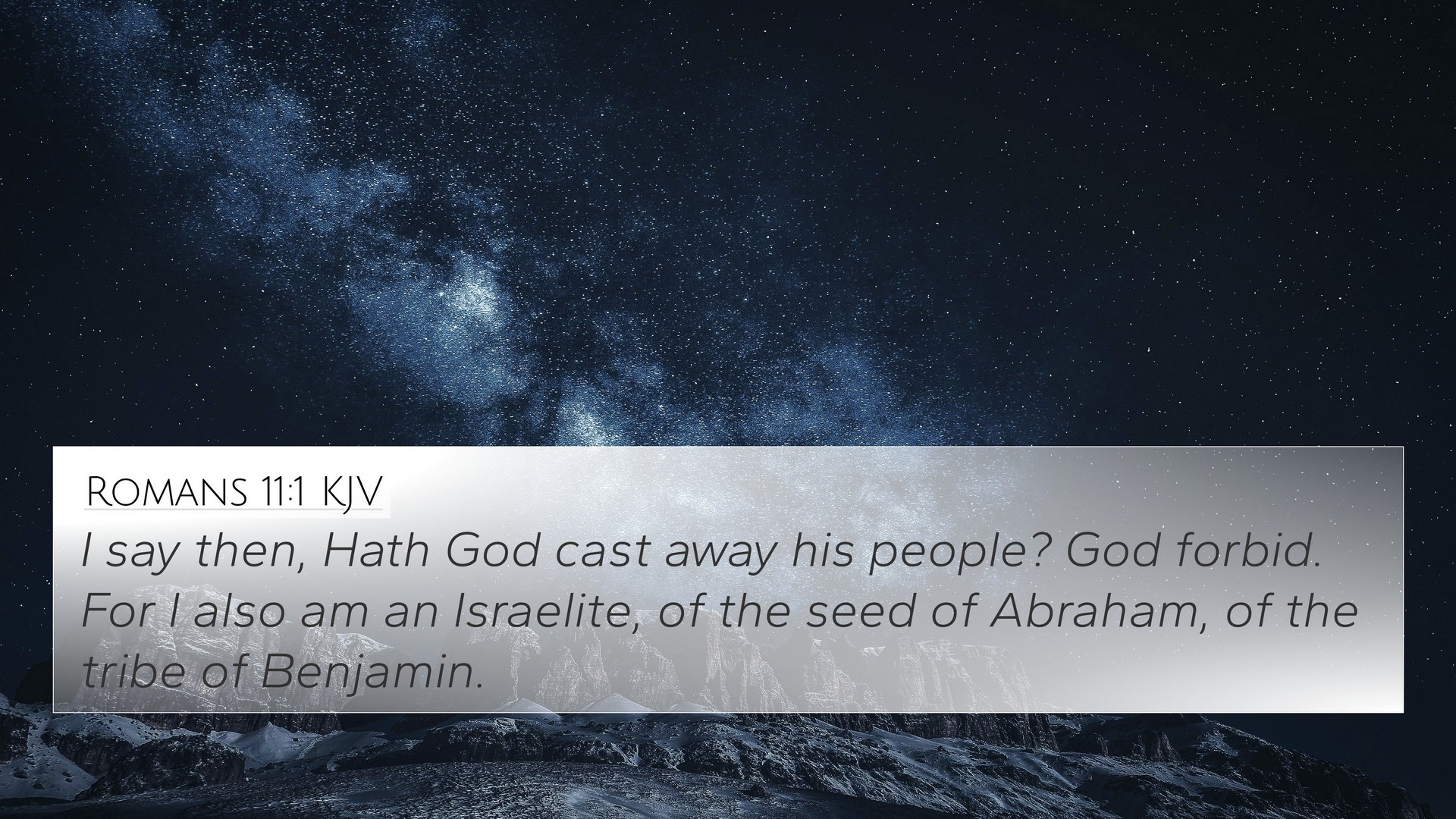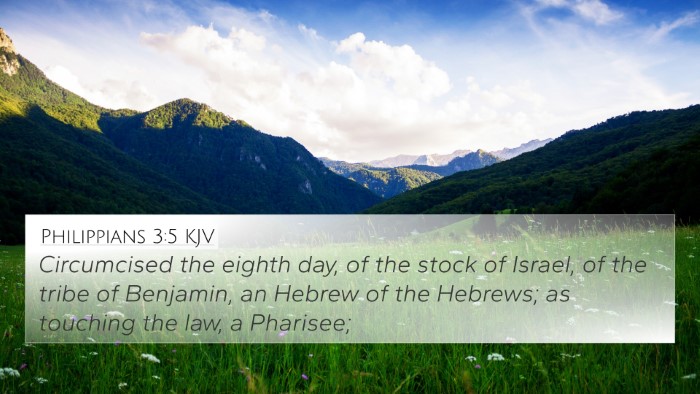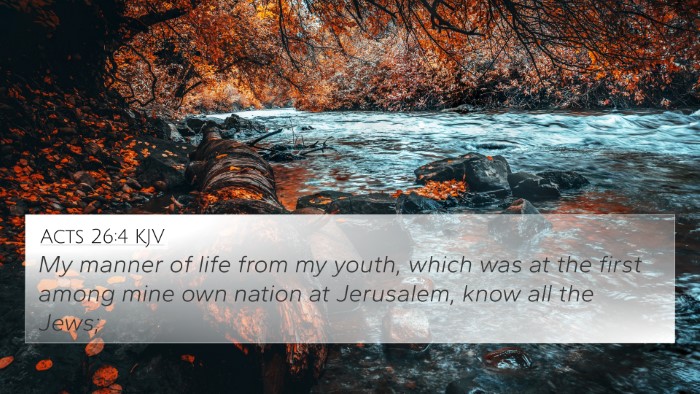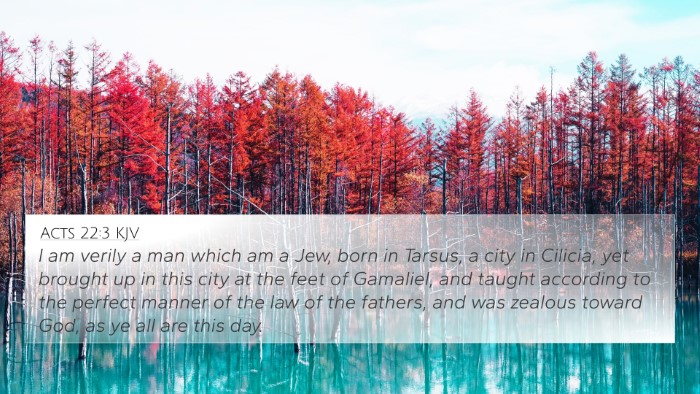Understanding Romans 11:1
Bible Verse: Romans 11:1 - "I say then, Has God cast away his people? God forbid. For I also am an Israelite, of the seed of Abraham, of the tribe of Benjamin."
Verse Meaning and Insights
The verse expresses a profound theological truth regarding God's relationship with Israel and His commitment to His chosen people. Paul, the author of Romans, addresses a potential misunderstanding among the Gentile believers about God's faithfulness to Israel. He categorically denies the notion that God has permanently rejected His people, affirming his own Jewish identity as a testament to God's ongoing covenant.
-
God's Faithfulness: This verse underlines the theme of God's unbreakable covenant with Israel. According to Matthew Henry, it demonstrates that despite Israel's unfaithfulness, God remains faithful to His promises.
-
Personal Identification: Paul’s declaration as an Israelite emphasizes his connection to the heritage of God's chosen people, which Adam Clarke elaborates on by highlighting the significance of lineage and tribal identity within the context of God’s covenant.
-
Rejection vs. Remnant: Albert Barnes comments on the apparent rejection of many Jews during this time, but stresses that God's plan includes a remnant, suggesting ongoing hope for the Jewish people.
-
Intercessory Role: Paul’s role as an intercessor can be seen in his plea for Israel, which leads to discussions on spiritual heritage and the urgency of prayer for one's people, a recurring theme in Henry's exposition.
-
Covenantal Theme: The mention of Abraham connects to the Abrahamic covenant, establishing a theological background of God's relationship with Israel that transcends failure and speaks to a redemptive plan.
Bible Cross-References
Understanding Romans 11:1 can be greatly enhanced by exploring related Bible verses. Here are some pertinent cross-references:
- Isaiah 54:7-8: God's mercies towards Israel despite their rebellion.
- Jeremiah 31:35-36: The eternal nature of God’s covenant with Israel.
- Romans 9:6-7: The distinction between physical descent and true children of God.
- Hebrews 11:1: Faith as a crucial element of the relationship with God, reflecting the ideals Phil advocates for Israel.
- Romans 10:1: Paul's yearning for the salvation of his people, demonstrating his heart towards Israel.
- Acts 15:14-17: James discusses the inclusion of the Gentiles while still emphasizing God's covenant with Israel.
- Galatians 6:16: The inclusion of both Israel and the new people of God, emphasizing the unity of believers.
- Luke 1:68-70: Zechariah's prophecy highlights God’s redemption of His people.
- Matthew 5:18: Christ’s affirmation of the Law and the Prophets, anchoring the discussion of continuity between the Old and New Testaments.
- Revelation 7:4: The marking of the sealed of Israel, indicating God’s continuous plan for His people.
Connections Between Bible Verses
To gain a deeper revelation of Romans 11:1, consider its connections with these thematically related verses:
-
Identifying God's People: The link between Romans 11:1 and Romans 9:24-26 discusses who comprises God’s people, showing the inclusion of both Jews and Gentiles.
-
God's Sovereignty: The emphasis on God's sovereignty in Romans 11:2 builds upon the idea expressed in the first verse, reinforcing the Lord's enduring relationship with Israel.
-
Historical Context: The historical rejection by many Israelites in John 1:11 highlights the seriousness of Paul's declaration in Romans 11, emphasizing the juxtaposition of rejection and remnant.
-
Thematic Parallels: Romans 11:1 also invites comparison with Matthew 15:24, where Jesus mentions His mission to Israel, yielding insights into God's redemptive plan.
Conclusion
In summary, Romans 11:1 serves as a powerful assertion of God’s faithfulness to Israel amidst the backdrop of the early church, which faced challenges of understanding God's plan of salvation for both Jews and Gentiles. Employing cross-references enhances comprehension and facilitates thematic studies of scripture, linking both Testaments and reinforcing the continuity of God's redemptive theme throughout the Bible.

















